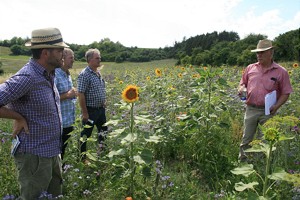© Global Nature Fund
In mid-July, a guided tour of flowering areas took place in the Bliesgau biosphere reserve as part of the “LIFE insect-promoting regions” project
Representatives from agriculture, authorities and nature conservation discussed the possibilities and limitations of flowering areas as an insect protection measure
Native wild plant species are an important building block for preserving our native insect diversity

Bonn, 28.07.2022: As part of the EU-funded “LIFE Insect-Promoting Regions” project, the Global Nature Fund (GNF), together with Kirchheimerhof and the Bliesgau Biosphere Association, hosted a guided tour of flowering areas with an expert discussion in mid-July. 20 participants from agriculture, nature conservation and authorities discussed the possibilities and limitations of flowering areas as an insect protection measure.
Richard Schreiner, the lead farmer, reported: “This year, I have implemented a total of 7 hectares of flowering areas together with various partners and on my own initiative. The flowering areas were sown with both annual crop mixtures and perennial wild plant mixtures.” It is precisely these perennial mixtures with native wild plants that offer insects a food supply and thus a chance of survival in the agricultural landscape, as Jenja Kronenbitter, GNF project manager, explained: “In the course of evolution, many native insects have specialized in certain plants that are also native to the area. If these food plants disappear, the adapted insects also disappear. Alongside other measures, flowering areas can contribute to the preservation of plant diversity in the agricultural landscape.”
For flowering areas to have this effect, the framework conditions for the measures must be right. At present, there are still many bureaucratic hurdles and farmers often lack attractive funding for perennial flowering areas with native wild plants – after all, no agricultural production takes place on a flowering area. Farmers want to be paid fairly for this loss of income and for the costs of planting and maintaining the land. In the LIFE Insect-Friendly Regions project, project partner Nestlé is responsible for this.
As the event showed, there is great interest in flowering area measures, agricultural practice in planting and maintenance and sensible implementation in terms of nature conservation. The discussion between agriculture, nature conservation and the authorities helps everyone to get the sustainable protection of our native insects off the ground together.
Background
Alongside climate change, biodiversity loss is the biggest environmental problem of our time. For example, 48 percent of wild bee species in Germany are considered endangered or are already extinct. According to the World Biodiversity Council, around one million species worldwide are acutely threatened with extinction. One of the aims of the EU LIFE pilot project Insect-Friendly Regions is to provide insights into what the agriculture of our future could look like so that it provides sufficient habitat for pollinators. In the EU LIFE project’s flowering areas, mainly annual crops such as buckwheat, phacelia and sunflowers bloom in the year they are sown. From the second year onwards, the areas are dominated by native wild plants. A monitoring program accompanying the project will show which wild bees are busy on these flowering areas in the Bliesgau biosphere reserve and are benefiting from the measure. Project partners are the Lake Constance Foundation, the Flowering Landscape Network, the Schwäbisch Hall Farmers’ Producers’ Association and Nestlé. Other pilot regions include Lake Constance, the Allgäu, Hohenlohe, the Northern Upper Rhine, the Saxon Loess Fields and the Wendland. The findings from the pilot projects are transferable to regions throughout Europe.
Find out more about our EU LIFE project Insect-promoting regions
Contact us
Global Nature Fund (GNF) – Bonn Office
Stefan Hörmann, Project Manager
Phone: +49 228 184 86 94 11
E-mail: hoermann@globalnature.org
Global Nature Fund (GNF) – Bonn Office
Jenja Kronenbitter, Project Manager
Phone: +49 157 33085788
E-mail: kronenbitter@globalnature.org